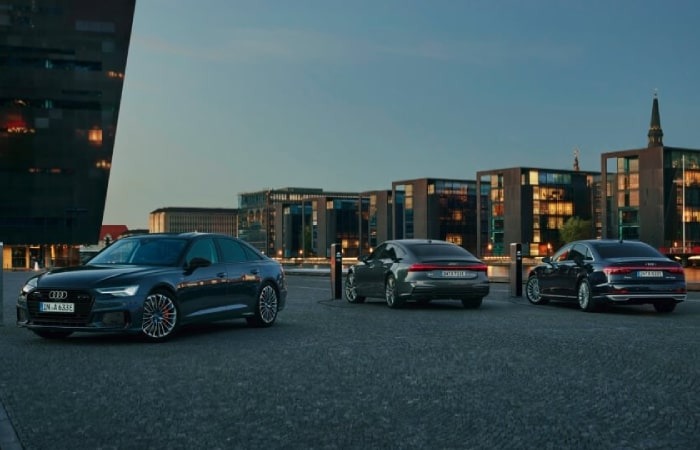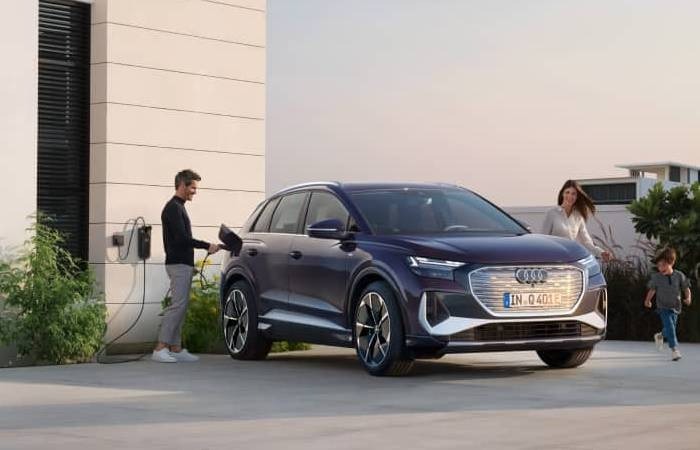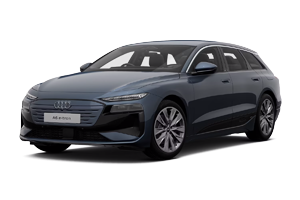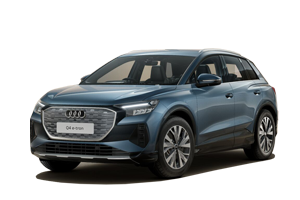
The Home of Audi Hybrid & Electric
From taking advantage of grants and incentives, to joining the movement for our planet’s sustainable future, there are lots of reasons to go electric today.
With an exciting range of fully electric and plug-in hybrid models available and our sights set on being completely CO₂ neutral by 2050, we’re transforming our business – and your driving experience.
Charging That Has You Covered
95% of car journeys in the UK are less than 25 miles² so most of your journeys could be covered by charging at home with a home wall box.
Easier Than You Might Think
The average car spends about 80%¹ of the time parked at home. During this time your electric vehicle could be charging.
Cheaper Charging
With electricity currently around two-thirds cheaper³ than petrol or diesel, it could cost less than you think to top up your electric Audi.
A Growing Network
For longer journeys, there are now thousands of public charging stations across the UK with new ones being added every day.
Discover electric Audi cars
Explore our plug-in hybrid (TFSI e) and fully electric (e-tron) cars here.
Electric Heart. Technology Head.
Every Audi reacts to the road, to the conditions and to you. Electric Audi vehicles are no exception.
Discover the latest advances, such as recuperation which charges the battery as you drive, and the latest smart connected car technology that links you, your car and your smartphone.
The future awaits. Discover the fully electric Audi collection with official test value ranges of 195 - 320 miles*.
Our plug-in hybrid cars have a combustion engine and electric motor, giving you the best of both worlds. Our TFSI e models have official test value electric ranges of 28 - 43 miles*.


A New Chapter of Vorsprung durch Technik
We have an exciting range of fully electric and plug-in hybrid models available, with more joining our line-up, and we’re investing €10 billion by 2025 into the future of electric mobility.
By 2025 we will have 30 new electrified models and all Audi plants are set to be carbon-neutral^. From 2026, Audi will only launch new fully-electric models and by 2030 all new car sales in the UK will be electric.
There are so many benefits to owning an electric Audi, here are just some of them:
- Reduced car tax (VED rates and Benefit In Kind)
- Less frequent servicing than a combustion car
- Travel for 5p per mile in a new fully electric Q4 e-tron 40 Sport, compared to 26p on a combustion vehicle⁴
- Fully electric vehicles have no tailpipe emissions
Audi Battery Degradation
Like the lithium-ion batteries in devices like smartphones, electric vehicle batteries gradually lose capacity with regular use and charging. This is important when comparing new and used electric vehicles on our site, as pre-owned models will have less battery capacity than new ones.
Battery "degradation" occurs naturally over time due to usage, charging cycles, and aging. In electric vehicles, this process is influenced by charging speed, driving habits, charge levels, and temperature. As batteries age, they may need more frequent charging, reducing the vehicle’s practical driving range.
New car performance figures for battery capacity and range don’t reflect the real-world performance of used vehicles with older batteries.
Every fully electric Audi Approved Used car under 8 years old receives a thorough multipoint check and a battery health certificate, indicating its current condition. Audi UK’s warranty also covers battery degradation, maintaining at least 70% capacity for up to 8 years or 100,000 miles.
Terms and Conditions
1. According to: https://www.racfoundation.org/assets/rac_foundation/content/downloadables/facts_on_parking.pdf
2. According to: https://www.theaa.com/cars/news/aa-cars-news/what-to-consider-when-buying-a-used-electric-car-13361.html
3. According to UK Power: https://www.ukpower.co.uk/home_energy/tariffs-per-unit-kwh, the average electricity cost is currently (January 2020) 14.37p/kWh
4. Calculation based on Q4 e-tron 40 Sport with an electric range of up to 314 (WLTP cycle) vs Q3 35 TFSI Sport S tronic with a combined 44.1 mpg (WLTP consumption). Average price of petrol 145.7p as of January 2022 (Source AA). Average price of electricity 21p/kWh (Source Nimble Fins using UK Gov figures ) as correct January 2022.
* All vehicles are tested according to WLTP technical procedures. Figures shown are for comparability purposes; only compare fuel consumption, CO2 and equivalent electric range figures with other vehicles tested to the same technical procedures. These figures may not reflect real life driving results, which will depend upon a number of factors including but not limited to optional factory fitted options , accessories fitted (post-registration), variations in weather, road and traffic conditions, individual driving styles, vehicle load , vehicle condition, using systems like climate control (and, for battery electric vehicles, the starting charge of the battery). Figures for plug-in hybrid vehicles were obtained using a combination of battery power and fuel. Plug-in hybrid vehicles require mains electricity for charging. Figures for battery electric vehicles were obtained after the battery had been fully charged. Battery electric vehicles require mains electricity for charging. Zero emissions while driving. Figures quoted are subject to change due to ongoing approvals/changes and range figures may include options not available in the UK. Please consult your local Audi Centre for further information. Data correct at August 2022.
^Audi regards net carbon neutrality as a state in which, following the exhaustion of other possible measures aimed at reducing the still remaining CO₂ emissions caused by the products or activities of Audi and/or currently unavoidable CO₂ emissions within the scope of the supply chain, manufacturing and recycling of Audi vehicles, at least quantitative compensation is provided through voluntary and globally conducted compensation projects. Throughout the utilisation phase of a vehicle, meaning from when a vehicle is delivered to a customer, CO₂ emissions produced are not taken into account.













